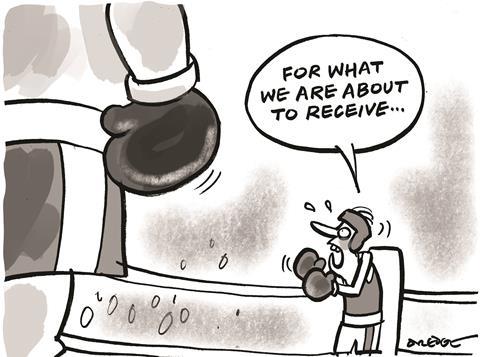
Perhaps you’ve been there. A family from church invite you for a meal. You don’t know them well, but are pleased by the opportunity. You chat while you wait for the food, and then, as the plates arrive, tension grips you.
You glance around the table, hoping for a hint: Do these people say grace before eating, or do they view that as an empty religious tradition? Nobody makes a move and so you dig in, only to be on the receiving end of a frosty glare: “Are we not thankful to the Lord for his bountiful provision?” says someone, snootily. Ashamed, you mumble an apology, swallow your unblessed chicken and endure a lengthy intercession, which includes prayer for everything but the food.
So, should we offer thanks for meals? Jesus was in the habit of blessing food, as was Paul, who wrote to his apprentice Timothy and, in a conversation about food laws, encouraged gratitude: “Everything God created is good. You shouldn’t turn anything down. Instead, you should thank God for it. The word of God and prayer make it holy.” (1 Timothy 4:4–5, NIRV). Let’s neither be legalistic, condemning those who don’t say grace, or dismissive, suggesting the custom is just religious routine.
This much is certain: we are called to practise thankfulness, and not just at mealtimes. Paul’s life and letters reverberate with thankfulness. Sometimes the apostle is tagged as an awkward stoic, so focused on his mission that he might have been difficult to get along with. But a closer look shows him in a much warmer light. He had a lot of friends. Writing to the church in Rome, he listed no less than 33 in his final greetings. He rarely thanked God for things, but was often thankful for people.
The writer GK Chesterton was a literary – and literal – giant. The prolific author was six foot four tall and weighed 300lbs. He enjoyed food, but also celebrated so much more in his life: “You say grace before meals. I say grace before the concert and the opera, and grace before the play and the pantomime, and grace before I open a book, and grace before sketching, painting, swimming, fencing, boxing, walking, playing, dancing and grace before I dip the pen in ink.”
Last month, I wrote about the joy I’ve found in discipline in my daily practices. I’ve been helped by marrying thankfulness with those choices. Instead of saying “I must” pray, exercise, give generously, serve etc, I say: “I get to”.
When I celebrate that I am healthy enough to work out, have enough finances to give and am privileged to know Jesus through prayer, my perspective changes. Discipline becomes a delight.
But when it comes to saying grace before meals, sometimes it can go wrong. A Christian couple invited a family over for a meal. Wanting to impress their guests, the mum invited her son to give thanks.
“Charlie, say grace,” she smiled. The scowling infant folded his arms in defiance: “No!”
“Come now, darling, we’d love you to say a prayer before we eat.”
Charlie was resolute.
Desperate, she cajoled: “Charlie, please go ahead and just say what Daddy said at breakfast this morning.”
With a mischievous smirk on his face, Charlie closed his eyes, bowed his head, and said: “Oh Lord, we’ve got those awful people coming for dinner tonight.”
Awkward.





































No comments yet